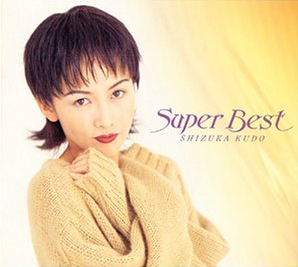
Super Best is the sixth compilation album by Japanese singer Shizuka Kudo. It was released on November 19, 1993, through Pony Canyon. It is Kudo's first single collection, featuring all A-sides produced by Tsugutoshi Gotō and released by Kudo since her solo debut, from "Kindan no Telepathy" up to the most recent at the time, "Anata Shika Inai Desho", spread out on two discs. The compilation also includes one new song, entitled "Honō no Naka e", which was written specifically for the album and which marks the last collaboration with Gotō until 2015, when he composed "Tan Jun Ai vs Hontō no Ai" for the compilation My Treasure Best: Miyuki Nakajima × Tsugutoshi Gotō Collection. Super Best was re-released in APO-CD format on December 1, 1993.

Rosette is the fifth studio album by Japanese singer Shizuka Kudo. It was released on April 4, 1990, through Pony Canyon. Initially titled Mysterious II, Rosette is Kudo's first album to be entirely arranged by Tsugutoshi Gotō and his band members, credited under the name Draw4. The limited first pressing of the album came in a special box packaging. Rosette was re-released in APO-CD format on December 1, 1993.
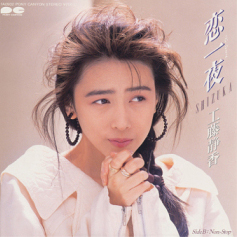
"Koi Hitoyo" is a song recorded by Japanese singer Shizuka Kudo, released on December 28, 1988, by Pony Canyon as the lead single from her third studio album Joy (1989). Almost a year later to the day, Kudo marked her second appearance on Kōhaku Uta Gassen by performing "Koi Hitoyo".

"Kuchibiru Kara Biyaku" is a song recorded by Japanese singer Shizuka Kudo for her fifth studio album, Rosette. It was released by Pony Canyon as the album's lead single on January 10, 1990. Although it was not officially released on vinyl, a few copies were produced for promotional use. Kudo performed the song on the 41st Kōhaku Uta Gassen, marking her third appearance on the program. In 2015, DAM asked their users to select their favorite Shizuka Kudo songs to sing karaoke to and compiled a top ten list; "Kuchibiru Kara Biyaku" came in at number six.
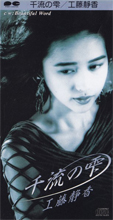
"Senryū no Shizuku" is a song recorded by Japanese singer Shizuka Kudo. It was released as a single through Pony Canyon on May 9, 1990. It marks the debut of Kudo as a songwriter. The song was featured on commercials for Taiyo Yuden That's cassette tapes. Similarly to her previous single, "Kuchibiru Kara Biyaku", a limited number of 7-inch vinyls of the single were produced for promotional use. "Senryū no Shizuku" has never appeared on an original album, but was included in the compilation album Unlimited (1990).

"Watashi ni Tsuite" is a song recorded by Japanese singer Shizuka Kudo. It was released as a single by Pony Canyon on September 21, 1990. The song made its first album appearance on the compilation album Unlimited, released that same year.

"Please" is a song recorded by Japanese singer Shizuka Kudo. It was originally intended to be included on Kudo's sixth studio album, Mind Universe, but was dropped at the last minute. The song was released as a single by Pony Canyon shortly thereafter on May 15, 1991. It made its first album appearance on the compilation album Intimate.
"Metamorphose" is a song recorded by Japanese singer Shizuka Kudo. It is the theme song for the CX television series Nandara Mandara, which starred Kudo herself. It was released as a single through Pony Canyon on October 23, 1991. "Metamorphose" made its first album appearance on the compilation album, Intimate. Kudo performed the song on her fourth appearance on Kōhaku Uta Gassen. In 2015, DAM asked their users to select their favorite Shizuka Kudo songs to sing karaoke to and compiled a top ten list; "Metamorphose" was one of the top vote-getters, rounding up the list at number ten.

"Ice Rain" is a song recorded by Japanese singer Shizuka Kudo for her tenth studio album, Purple. It was released through Pony Canyon as the album's lead single on November 18, 1994, merely two months following the release of her ninth studio album, Expose. The single was released simultaneously with Kudo's third video album, Female III. An English version of the song was recorded for the compilation album, Best of Ballade: Current (1998). In 2015, DAM asked their users to select their favorite Shizuka Kudo songs to sing karaoke to and compiled a top ten list; "Ice Rain" came in at number three and was the only song penned by Kudo to make the top ten.

"Gekijō" is a song recorded by Japanese singer Shizuka Kudo, from her twelfth studio album, Dress. It was released by Pony Canyon as the album's lead single on November 7, 1996. It is the theme song of the CX television series Yuzurenai Yoru, starring Kudo herself. "Gekijō" was written by Miyuki Nakajima specifically for the drama; after reading the script, Kudo immediately thought of Nakajima for the soundtrack and sought to have her write the theme song. Nakajima's lyrics invoke the series' title, which loosely translates to "Unyielding Night".

"Kirara" is a song recorded by Japanese singer Shizuka Kudo. It was released as a single by Pony Canyon on July 17, 1998. Both "Kirara" and its coupling song, "In the Sky", were prominently featured on the CX television series, Kamisama, Mō Sukoshi Dake. Kudo performed the song on the 49th Kōhaku Uta Gassen, accompanied by Taro Hakase on the violin, marking her eighth and last appearance on the show. "Kirara" made its first album appearance on the compilation album, Best of Ballade: Current, for which Kudo also recorded an English version of "In the Sky".
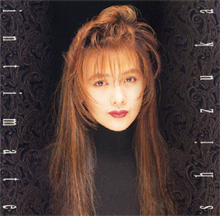
Intimate is the fourth compilation album by Japanese singer Shizuka Kudo. It was released on December 11, 1991, through Pony Canyon. The album features all singles released from "Koi Hitoyo" (1988) through "Metamorphose" (1991). The opening track, "Dare mo Shiranai Blue Angel" is a re-worked solo recording of an Ushirogami Hikaretai song by the same name released as a B-side to the single "Hora ne, Haru ga Kita" in 1988. The closing track is a new song entitled "Rashikunai", written specifically for the album by Kudo herself, under the pseudonym Aeri.

Expose is the ninth studio album by Japanese singer Shizuka Kudo. It was released on September 7, 1994, through Pony Canyon. The album was recorded and mastered in Los Angeles. Expose is Kudo's first self-produced album. It yielded the two singles, "Blue Rose" and "Jaguar Line".

Rise Me is the eighth studio album by Japanese singer Shizuka Kudo. It was released on April 1, 1993, through Pony Canyon. Rise Me is Kudo's last album to be produced by Tsugutoshi Gotō. It yielded Kudo's best-selling single, "Dōkoku".

Trinity is the seventh studio album by Japanese singer Shizuka Kudo. It was released on March 18, 1992, through Pony Canyon. Trinity is Kudo's last album to be produced by Tsugutoshi Gotō. It yielded Kudo the single, "Mechakucha ni Naite Shimaitai", which became one of Kudo's signature ballads. The album also includes one of Kudo's longest recorded songs, the album closer "Suterareta Neko Janai Kara", which runs for over seven minutes.

Mind Universe is the sixth studio album by Japanese singer Shizuka Kudo. It was released on March 6, 1991, through Pony Canyon. It features the single "Boya Boya Dekinai". The album was re-released in APO-CD format on December 1, 1993. Mind Universe became Kudo's fourth number-one album and her last record to top the Oricon Albums Chart.

Harvest is the second compilation album by Japanese singer Shizuka Kudo. It was released on December 6, 1989, through Pony Canyon, merely two months after the release of the album Karelia. Harvest features the singles "Koi Hitoyo", "Arashi no Sugao" and "Kōsa ni Fukarete", their B-sides, a few select tracks from Kudo's three studio albums released at the time, Mysterious, Shizuka and Joy, as well as a new song recorded and co-written by Kudo for the album.

Gradation is the first compilation album by Japanese singer Shizuka Kudo. It was released on November 30, 1988, through Pony Canyon. The album includes all five singles released by Kudo at the time, from "Kindan no Telepathy" through "Mugon... Iroppoi", their coupling songs, as well as one new song, entitled "X'mas ga Ippai", recorded specifically for the compilation. Gradation was re-released in gold CD format on March 21, 1989.
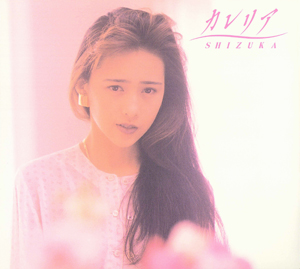
Karelia is the fourth studio album by Japanese singer Shizuka Kudo. It was released on October 4, 1989, through Pony Canyon. It is a concept album inspired by the music from Finnish Karelia. The album was entirely recorded in Finland and features the Helsinki Philharmonic Orchestra as well as a choir group from the University of Helsinki. Despite being composed and produced by Tsugutoshi Gotō, Karelia lacks any trace of the signature rock style of Gotō's other compositions. The record features lyrics penned by Taeko Onuki and also includes the first song written by Kudo herself, under the pseudonym Aeri. While in Finland, Kudo created oil paintings inspired by the people and landscapes, which were incorporated into the design of the album's packaging. Karelia was re-issued in APO-CD format on December 1, 1993.

Joy is the third studio album by Japanese singer Shizuka Kudo. It was released on March 15, 1989, through Pony Canyon. It is the first of three albums released by Kudo that year: it was followed by the concept album Karelia in October and the compilation album Harvest in December. A limited first pressing of Joy was released in gold CD format. Kudo has stated that Joy is one of her favorite albums she has recorded. Nanase Aikawa has also listed the album as a major influence behind her decision to pursue a musical career. Joy was re-issued in APO-CD format on December 1, 1993.



















